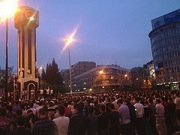By: Sami Jarjour
President Bashar al-Assad and the Syrian government apparently have no construct of even the slightest degree of human rights. Philip Luther, Amnesty International’s Deputy Director for the Middle East and North Africa, described recent events (July 31) as the “deadliest assault yet on mainly peaceful protesters calling for reform,” and shows that it is “clear that President Bashar al-Assad is unwilling to halt his security forces.” He further remarks that the UN must take action against “this violent campaign of repression.” But unfortunately, the UN has not taken meaningful action to halt the deaths and torture of protesting Syrians.
Sarah Leah Whitson, Middle East director at Human Rights Watch, presents an accurate picture of the struggle: “President Assad talks reform but continues to practice repression, not only through the widespread killings of demonstrators but also through mass arrests. Who does President Assad mean to include in his ‘national dialogue’ when his security forces are targeting the very people who might have something to say to him?” This continuing use of violence towards protestors reasserts that President Assad’s reforms are in fact merely reactive and symbolic, not to be seriously enforced or expanded upon to help create a more just state.
Justifications have of course been given for the security forces’ merciless actions since the Syrian uprising. The Islamists or deceiving foreign conspiracies or whatnot are to blame. It seems the Arab dictators from Egypt to Bahrain cannot come up with an original refrain to save their reputations (or their governments). Or perhaps the reason for these protests comes from something more sinister, such as want for freedom, justice, and democracy. The level of hypocrisy of President Assad and the rest of the dictators is truly astonishing.
At the present time, it is difficult to predict what will take place in Syria. A Western invasion is unlikely; Syria is not as important a target as Libya, the latter’s oil resources being significant. Turkey, now harboring Syrian refugees, may have a substantial say in the matter in the end. Internally, there is latency for civil war. Sadly, we can only continue to look on from the sidelines as this deadly conflict persists, with hope that justice prevails in a country that is in such dire need of it.

